Diarrhea is a common problem in all dogs that suffers from diarrhea at some point in every dog’s life. Diarrhea can also be caused by more serious problems, like poisoning or systemic disease. It is important to understand that diarrhea in dogs can take several forms.
What is dog diarrhea?
Diarrhea is defined as the rapid movement of fecal matter through the digestive tract, involving poor absorption of water, nutrients and electrolytes and passage of soft, watery, unformed stools. Diarrhea usually is a sign that something is bothering the dog’s gastrointestinal tract. It can also be caused by more serious health problems, some of which require close attention, especially if the diarrhea is severe or occurs
Diarrhea color
Color can also indicate a lot about what is going on inside your dog’s gut. Chocolate brown is normal, while colors like orange, green, or gray may signify issues with such organs as liver, gall bladder, or pancreas. Black tarry stool is very serious, and may point to internal bleeding. If you see this, contact your vet as soon as possible.
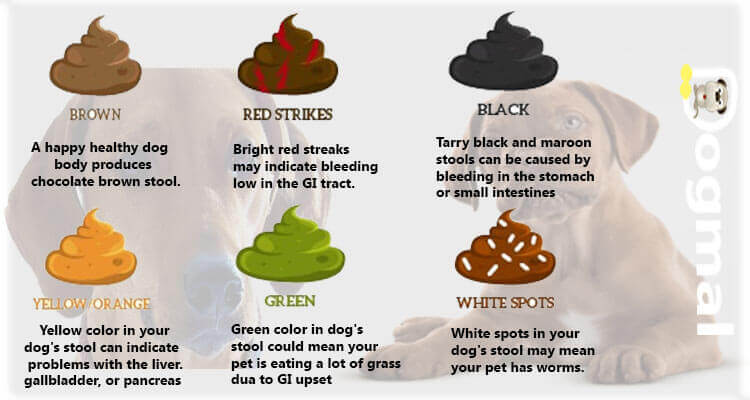
Symptoms of dog diarrhea
Loose stools are of course the main indicator of diarrhea. Diarrhea may also be accompanied by vomiting, loss of appetite, weight loss, abdominal pain, lethargy, and other symptoms of disease.
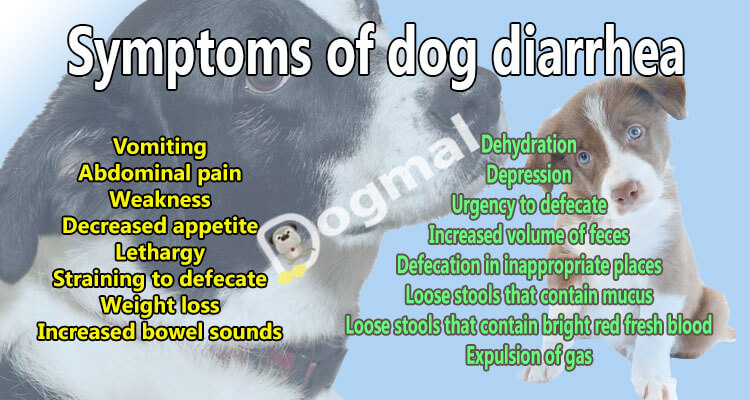
- Vomiting
- Abdominal pain
- Weakness
- Decreased appetite
- Lethargy
- Straining to defecate
- Weight loss
- Increased bowel sounds
- Dehydration
- Depression
- Urgency to defecate
- Increased volume of feces
- Defecation in inappropriate places
- Loose stools that contain mucus
- Production of loose, watery, unformed stools
- Loose stools that contain bright red fresh blood
- Expulsion of gas
A less obvious and often confusing symptom of diarrhea can be when your dog strains to go. It actually looks more like constipation than diarrhea.
Other symptoms that can go along with diarrhea include fever, lethargy, malaise, loss of appetite, and dehydration.
If your dog’s diarrhea is black, he could be experiencing internal bleeding of the stomach or small intestine and should be examined by a vet immediately.
If your dog shows any signs of it, contact your veterinarian.
Causes of diarrhea in dogs
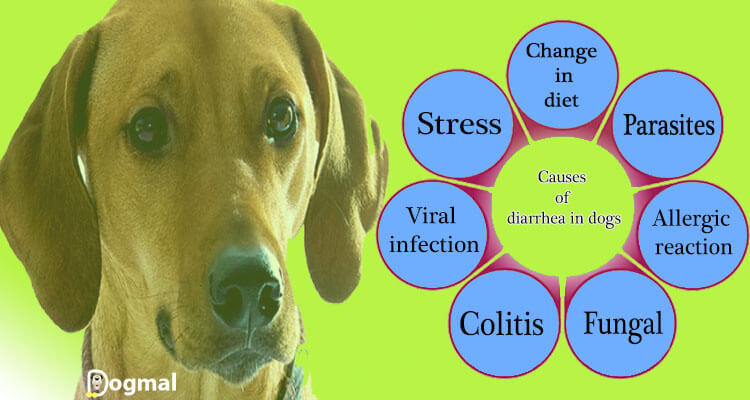
Since there are numerous causes of diarrhea in dogs it is always a good idea to have your dog examined by a veterinarian to rule out more serious causes. There can be many reasons for diarrhea in dogs, which is very important to know or timely treatment is also needed. Dog diarrhea has four general reasons for occurring: osmotic imbalances, over secretion, intestinal exudation or motility disorders.
There are a number of causes of diarrhea in very young dogs including:
- Stress
- Change in diet
- Ingestion of a foreign object
- Parasites
- Viral infection
- Allergic reaction
- Colitis
- Fungal
- Drugs and Toxins
- Bacterial or viral infection
- Kidney, liver disease or pancreatic disease
- Internal parasites, such as roundworms, coccidia and giardia
- Cancer or other tumors of the digestive tract
- Inflammatory bowel disease
- Certain medications
Primary Causes of Diarrhea in Dogs
There are a lot of reasons dogs develop loose stools. The most common reason is dietary indiscretion, which means your dog ate something she shouldn’t have. Diarrhea that develops suddenly in an otherwise healthy dog is often due to scavenging behavior, stress, a sudden change in diet, or viral, bacterial or parasitic infections. If your puppy is having diarrhea, there’s no reason to panic unless the problem is very severe.
How to take care of dog diarrhea?
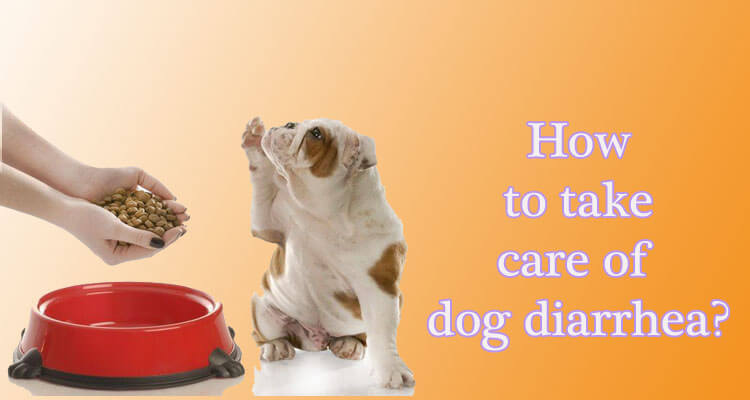
Diarrhea is a common problem for our dog companion. Diarrhea many cases are not serious and can be solved with the home care.
- Ease your dog off his fast with bland food. After the fasting period, do NOT put the dog straight back onto his regular diet. Instead, offer him food that is gentle on his stomach and easy to digest.
- Transition your dog slowly back to a regular diet. Once your dog’s diarrhea has safely passed, you can begin easing him back into a normal diet.
- Provide fresh drinking water. During this period of fasting, let the dog have access to clean, fresh drinking water.
- Do not give your dog medications for human diarrhea.
- Check for dehydration. Diarrhea is basically feces that contain a large amount of fluid. If the dog passes a lot of diarrhea and doesn’t replace that fluid, he will become dehydrated.
- Take his temperature. Simple diarrhea is rarely accompanied by a fever. If your dog’s running a fever, he’s probably suffering from an infection of some sort.
- Monitor your dog for weakness, lethargy, or collapse
Immediate Care for Dog Diarrhea
- Make sure the dog has access to plenty of clean water to avoid dehydration. Encourage the dog to drink. If needed, offer dilutes chicken, beef broth or Pedialyte in addition to the water.
- If the diarrhea continues for more than 24 hours or your dog’s condition worsens at any time, contact your vet immediately.
- Give the dog a small meal of boiled white meat chicken and white rice. This can be the dog’s diet until the stool consistency returns to normal.
- Remove all food for 12 hours.
- Wait two hours. If the dog has not vomited, then offer another small meal of cooked chicken and rice.
In order to stop a dog’s diarrhea, it is best to temporarily withhold any food, but to still provide fresh, clean water to flush out the dog’s system.
In dogs, diarrhea is a common problem, and stopping it is often as simple as controlling your dog’s diet. Some cases of diarrhea in dogs, however, are caused by health issues other than mild dietary indiscretion. These cases require prompt veterinary attention.
If you have a healthy adult dog with sudden dog diarrhea and no other symptoms, you can try to treat the problem with home care. Home care for a dog with diarrhea involves providing a period of gut rest to allow the intestines to heal.
Treatments of Dog Diarrhea
Many cases of diarrhea in dogs are cleared up within twenty-four hours, especially if your dog is young and healthy.
Home Remedies for Dog Diarrhea
Following are some effective home remedies for a dog’s diarrhea
Bland Diet: – After the fasting period, take away his normal food and replace with boiled chicken and rice or boiled hamburger and rice. Make the rice the bulky part of the meal. Keep giving this diet until the stools seem better formed. The most common recipes for bland diets include low-fat foods. So you can use it.
Over-the-counter medications for humans may also be effective for doggie diarrhea, but should be given with caution and you should talk to your vet before using them.
Keep Your Dog Hydrated: – Your dog is better off if he is kept from consuming an excessive amount of water, but only if the diarrhea isn’t severe. If he has more extreme diarrhea then he needs as much water as possible.
Slippery Elm: – The herb known as slippery elm might be useful for persistent diarrhea, including inflammatory bowel disease in dogs. The dosage of the herb in a dried form is 20 mg per pound of body weight 1-2 times a day.
Supply Yogurt: – Give some plain yogurt or cottage cheese to give him a bit of good bacteria. You can add a dollop to his bland diet, which is described in more detail below.
Natural Remedies For Dog Diarrhea
Activated charcoal is a natural substance that can help clear the digestive system of both humans and dogs. The activated charcoal will help to absorb any toxins present and help to flush out any bacteria or viruses, or toxins from the digestive system.
Activated charcoal can typically be found at any pharmacy, natural food stores, or even pet supply stores.
Probiotics: – These will help repopulate the intestine with healthy bacteria and there is a growing research base showing they boost the immune system in the digestive tract as well as the rest of the body. Probiotics help maintain the mucosal barrier and enhance cellular repair.
Dog Diarrhea Medicine
We have categorized the best dog diarrhea medicine and cures as follows
- Mild
- Severe
- Chronic (recurring)
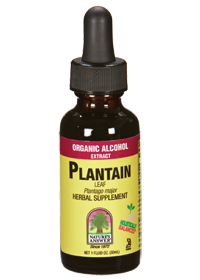
Plantain: – in tincture form, using 25 drops mixed into to 1 ounce of distilled water, give 1-3 droppers full 3-4 times daily for 3 days, curtails diarrhea and acts as an antimicrobial. It’s supports the health of the digestive system and mucous membranes.
You can see healthy food for your dog
21st Century, Pet Natural Care, Anti Diarrhea Liquid, All Dog, 8 FL Oz (237 ml)
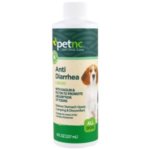
- Provide relief of diarrhea in puppies and dogs.
- Shake well before using. Apply directly into pet’s mouth or mixed into food every 12 hours. Individual results may vary.
- Do not use on pregnant dogs.
If symptoms persist after use for 2 to 3 days, consult your veterinarian.
People also ask about dog diarrhea
How long does dog diarrhea last?
Usually most dog diarrhea will run its course within two to four days, although in some cases, it can last longer.
Upload best Photos of your dog and we will show your dog photos in our Dog Gallery.
Submit your dog Photo
Click here to see more photos
Done. I tried to include maximum information in this post. Please like and share if you like this post. If you have any information about Dog Diarrhea, then send me via the contact form or comment below.
If you love to read information about various dog breeds, keep reading more posts here and take a look at most popular dog breeds 2017
References:
petpremium.com
petmd.com
dogsnaturallymagazine.com
